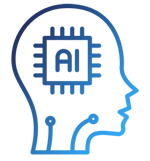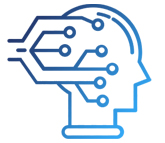- AI

Artificial Intelligence

Smart Products & Services
We follow Smart Products & Services

Intelligent Business Functions & Processes
We follow Intelligent Business Functions & Processes

Robotic Process Automation
We follow Robotic Process Automation

Personalized
healthcareWe follow Personalized healthcare

Identifying at-risk patients
We follow Identifying at-risk patients

Optimized routing and scheduling
We follow Optimized routing and scheduling
- ML

Machine Learning

Predictive
AnalyticsWe follow Predictive Analytics

Service Personalization
We follow Service Personalization

NLP
We follow NLP (Natural Language Processing)

Stock Market Forecasting
We follow Stock Market Forecasting

Fraud Prevention
We follow Fraud Prevention

Recommender engines
We follow Recommender engines
- blockchain
- IOT

Internet of Things
- AR
- Business Solutions

Business Solution

Business Performance Management
We follow Business Performance Management

Decision Making & Big Data Analytics
We follow Decision Making & Big Data Analytics

Enterprise Data Management
We follow Enterprise Data Management
- Apps

Apps

Native Apps
We follow Native Apps

Cross Platform Apps
We follow Cross Platform Apps

Web Apps
We follow Web Apps

Hybrid Apps
We follow Hybrid Apps

Cloud Native Apps
We follow Cloud Native Apps
- Lab

Six Applications of Artificial Intelligence to Maximise the Use of AI In 2023
You probably interact with artificial intelligence (AI) on a regular basis without even recognising it. Artificial intelligence services providers are transforming how we conduct business as well as making individuals more productive. In reality, 86% of CEOs report that although it takes the form of software to manage daily activities rather than robots or complex technology, AI is a staple in their workplaces.
Even though a lot of people still link artificial intelligence (AI) to dystopian science fiction stories, this association is fading as AI strategies advance and become more prevalent in our everyday lives. The phrase “artificial intelligence” is frequently used today and even appears on occasion.
Despite the fact that modern civilization has only recently come to embrace it, the concept of AI has been around for a while. Even though the first studies on artificial intelligence (AI) as we know it today were conducted in 1956, significant advancements had to be made before AI could be applied in technology.
Artificial intelligence is used in business in a wide range of situations. In actuality, most of us engage with Intelligence on a regular basis in some capacity. Artificial intelligence is already disrupting almost all corporate operations across all sectors, from the ordinary to the incredible. AI technologies are becoming more and more necessary as they spread in order to keep a competitive advantage.
What Is Artificial Intelligence (AI)?

It is crucial to define AI technologies before looking at how they are impacting company. In a broad sense, “artificial intelligence” refers to any kind of computer software that has the ability to plan, handle problems, and learn. Although using the term “artificial intelligence” to describe some applications is technically accurate, it leaves out all of the nuances. We need to look further to determine the type of artificial intelligence services providers offer that businesses are using most frequently.
-
Machine Learning
Machine learning is one of the types of AI that is now being developed for application in industry the most frequently. Machine learning’s primary goal is to quickly process massive volumes of data. These artificial Intelligence strategies (AIs) use algorithms that seem to “learn” over time.
A machine-learning algorithm’s modelling should get better as more data is provided. Massive data sets that are increasingly being collected by connected devices and the Internet of Things can be transformed by machine learning into human-understandable context.
If you are in charge of a manufacturing facility, the network is likely connected to your equipment. Data about manufacturing, functionality, and other issues are continuously collected at a central place by connected devices.
The majority of the patterns would undoubtedly be missed even if someone could sort through all the data because they would never be able to do so.
As data is received, machine learning can quickly analyse it to search for patterns and anomalies. A machine-learning system may recognise a machine in a manufacturing plant that is operating at a reduced capacity and alert decision-makers that it is time to send out a preventive maintenance team.
Yet, the field of machine learning is rather vast. Deep learning is made possible by artificial neural networks, a web-like structure of “nodes” that represent artificial intelligence.
-
In-Depth Learning

Deep learning, a more specialised form of machine learning, employs neural networks to do so-called nonlinear reasoning. Deep learning is required to finish increasingly challenging tasks, such fraud detection. It achieves this by simultaneously analysing a number of factors.
For instance, numerous factors need to be recognised, looked at, and resolved at once in order for self-driving cars to function. Self-driving cars employ deep learning algorithms to contextualise data gathered by their sensors, such as the location and speed of nearby objects and a forecast of where they will be in the next five to ten seconds.
A self-driving car can use all of this data at once to make decisions, such as whether to change lanes.
The corporate world has a lot of potential for deep learning, and it will probably use it more regularly. When additional data is gathered, deep learning models outperform earlier machine-learning algorithms, which have a tendency to plateau after a certain amount of data has been collected. Deep learning models are now significantly more complex, scalable, and independent as a result.
-
AI In Today’s Business
Artificial intelligence is frequently viewed as enhancing rather than replacing human intelligence and inventiveness. Although AI is now unable to do simple tasks in the real world, it is capable of rapidly analysing and absorbing enormous volumes of data. Artificial intelligence software would then present the human user with synthesised routes of action. With this approach, AI can speed up the decision-making process and simulate every action’s outcomes.
A form of advancement in software development is artificial intelligence. It’s a type of software that can function autonomously and make decisions even in circumstances that its creators had not anticipated. Compared to conventional software, artificial intelligence strategies have a larger range of decision-making capabilities.
These qualities make AI very helpful for a variety of organisations, whether it’s just guiding visitors and staff through a company website or handling a challenging task like monitoring a wind turbine to predict when it needs maintenance.
Typical Applications of AI

Some of the most popular uses of AI include machine learning, cybersecurity, customer relationship management, internet searches, and personal assistants.
-
Machine Learning
Machine learning is widely used in systems that gather massive amounts of data. Smart energy management systems, for instance, collect data from sensors attached to various assets. Before presenting the huge volumes of data to your company’s decision-makers, machine learning algorithms contextualise it so that they can better understand energy usage and maintenance needs.
-
Cybersecurity
By noticing trends in data intake, AI systems may be able to recognise cyberattacks and other cyberthreats. If a threat is recognised, it can scan your data backwards to find the threat’s source and help stop subsequent attacks. Having an additional set of eyes that is as watchful and consistent as AI will be very beneficial for your infrastructure.
-
Management of Customer Relationships
Systems for managing client relationships (CRM) are also altering as a result of artificial intelligence. IoT technology strategy require a lot of human interaction to stay correct and up to date. Yet, when AI is applied to these platforms, a standard CRM system becomes an auto-updating, self-correcting system that manages your relationships for you.
-
Using the Internet and Data

Massive amounts of data are analysed by artificial intelligence to identify trends in user search trends and provide users with more relevant information about their situation. As users use their devices more regularly and as AI technology advances, they will experience a more tailored user experience. This will make it easier for you to target a very specific market, which has significant consequences for your small businesses.
-
Personal Digital Assistants
More uses for artificial intelligence exist than just providing more individualised service to your clients. It might also change how your company runs internally. Artificial intelligence (AI) assistants can be used to manage emails, keep track of your schedule, and even make recommendations for streamlining processes.
-
The Potential of AI
What potential uses for artificial intelligence exists in the future? The majority of experts agree that those “commonsense” tasks will become even easier for computers to perform in the future, despite the fact that it is difficult to forecast how IoT technology services will develop. That suggests that robots will be very useful in day-to-day living.
Benefits of AI for Enterprises

Automation, data analytics, and natural language processing are some of the most widely used applications of AI (NLP). But what does this truly entail, and how does it improve productivity and streamline processes?
-
AI Automation
People are being saved from monotony because of automation. Teams no longer spend a lot of time on repetitive tasks, freeing up time for workers to focus on more worthwhile initiatives. Another advantage of AI automation is that it is more precise and less likely to miss any crucial information. Improved productivity and employee satisfaction!
-
Data Analytics
Data analytics gives companies access to previously unattainable insights by spotting unique patterns and relationships in data.
-
Tone Detection and NLP
NLP is on many people’s thoughts since it makes chatbots and search engines more helpful and increases accessibility for those with disabilities like hearing loss.
Conclusion
Artificial intelligence will surely play a part in the future, whether it is a happy or unhappy one, as it is coming closer and closer. As this technology develops, the world will see the emergence of whole new industries, a broad range of consumer applications, the replacement of some jobs, and the creation of others entirely. Although its impacts are still unknown, artificial intelligence and the Internet of Things have the potential to drastically change the economy. If you are looking for an artificial intelligence services providers, then get in touch with Sky Potentials.



















































Leave a Reply